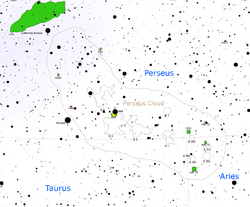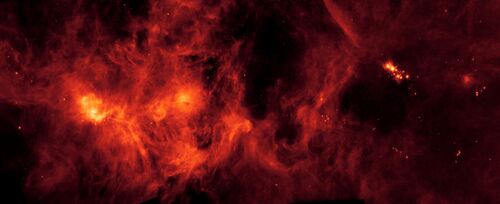Astronomy:Perseus molecular cloud
From HandWiki
| Molecular cloud | |
|---|---|
| Giant molecular cloud | |
 Map of the Perseus molecular cloud | |
| Observation data: J2000.0[1] epoch | |
| Right ascension | 03h 35.0m[1] |
| Declination | +31° 13′[1] |
| Distance | 956–1047 ly (293–321 [2] pc) |
| Apparent dimensions (V) | 6°×2° |
| Constellation | Perseus |
| Designations | Perseus Molecular Cloud, Perseus Cloud, Per MCld, Per Mol Cloud, Perseus Complex, PMC [1] |
The Perseus molecular cloud (Per MCld) is a nearby (~1000 ly) giant molecular cloud in the constellation of Perseus and contains over 10,000 solar masses of gas and dust covering an area of 6 by 2 degrees. Unlike the Orion molecular cloud it is almost invisible apart from two clusters, IC 348 and NGC 1333, where low-mass stars are formed. It is very bright at mid and far-infrared wavelengths and in the submillimeter originating in dust heated by the newly formed low-mass stars.
It shows a curious ring structure in maps made by the IRAS and MSX satellites and the Spitzer Space Telescope and has been detected by the COSMOSOMAS at microwave frequencies as a source of anomalous "spinning dust" emission.
References
- ↑ 1.0 1.1 1.2 1.3 "NAME Perseus Cloud". SIMBAD. Centre de données astronomiques de Strasbourg. http://simbad.u-strasbg.fr/simbad/sim-basic?Ident=NAME+Perseus+Cloud.
- ↑ Ortiz-León, Gisela N.; Loinard, Laurent; Dzib, Sergio A.; Galli, Phillip A. B.; Kounkel, Marina; Mioduszewski, Amy J.; Rodríguez, Luis F.; Torres, Rosa M. et al. (2018). "The Gould's Belt Distances Survey (GOBELINS). V. Distances and Kinematics of the Perseus Molecular Cloud". The Astrophysical Journal 865 (1): 73. doi:10.3847/1538-4357/aada49. Bibcode: 2018ApJ...865...73O.
- Bally, J.; Walawender, J.; Johnstone, D.; Kirk, H.; Goodman, A. (December 2008). The Perseus Cloud. 4. 308. ISBN 978-1-58381-670-7. Bibcode: 2008hsf1.book..308B.
- Kirk, Helen; Johnstone, Doug; Di Francesco, James (August 2006). "The Large- and Small-Scale Structures of Dust in the Star-forming Perseus Molecular Cloud". The Astrophysical Journal 646 (2): 1009–1023. doi:10.1086/503193. Bibcode: 2006ApJ...646.1009K.
- More on THE ASTROPHYSICAL JOURNAL http://iopscience.iop.org/0004-637X/656/1/293
 |



